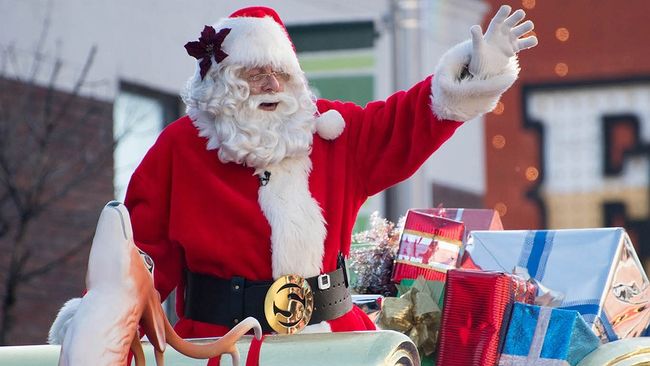原文|Washington Post, adapted by Newsela
乱译|中外物語
图片|原文或网络
今日主角|圣诞老人 Santa Claus/Father Christmas
Notes:This passage is compiled from Washington Post and also in line with the edition from Newsela,the original author is Cleve R. Wootson Jr.,General Assignment Reporter — Washington, D.C. Copyright © 2017 Washington Post. All rights reserved.
声明:原文是根据《华盛顿邮报》的报道和Newsela整理编辑的内容而来;源报道作者是“华邮”任务记者(国内新闻界应该叫首席记者)Cleve R. Wootson Jr.,版权归“华邮”所有。
Archaeologists find tomb of original St. Nicholas,and they say Santa dead.
考古学家发现圣诞老人“原形”——圣·尼古拉斯——墓穴,原来真有其人啊!
The good news is: Whoever told you that Santa Claus was an impostor with a fake beard or just a lie made up by your parents to trick you into being quiet was, at minimum, misinformed.
Now the bad news: Santa Claus is definitely dead.
好消息:圣诞老人的故事,一传十十传百,结果变成了误传,人们认定压根就没有圣诞老人,就连他的大胡子形象也是虚构的。其实不然!圣诞老人,真有其人。
坏消息:显然,圣诞老人已然作古。
Tomb Of Saint Nicholas
圣·尼古拉斯之墓
Archaeologists in southern Turkey say they have discovered the tomb of the original Santa Claus. Santa is also known as St. Nicholas, and the tomb is beneath the St. Nicholas Church near the Mediterranean Sea.
考古学家称在土耳其南部发现了圣诞老人墓穴。圣诞老人,为人熟知的另一个名字叫圣·尼古拉斯,他的墓穴就在近地中海的土耳其圣尼古拉斯教堂下方。
St. Nicholas of Myra, now Demre, was known for his gift-giving and generosity. People believed he'd put coins in the shoes of anyone who left them out for him on his feast day, December 6. He left the gifts anonymously, meaning he did not leave notes to say who the gifts were from. As the story goes, he was a monk who gave away a large amount of money he had inherited. He chose instead to help the poor and the sick. He's also the patron saint of sailors and was, of course, especially fond of children. A patron saint is someone believed to protect a particular place, person, or group of people. In this case, St. Nicholas was the protector of sailors.
米拉,现在改名为代木拉(音译)的圣·尼古拉斯,曾以为人善良,乐善好施而名满天下。据说,过去在12月6号“斋日”(也就是后来欧洲人的圣·尼古拉斯日),圣·尼古拉斯会在大家脱下的鞋子里放些硬币,见者有份;但他做好事从不留名。相传,他是个继承了一大笔财产的修道士。他并没有拿一大笔钱去挥霍潇洒,而是用之于接济穷人和病患。他同时也是水手的保护神;但他最喜欢的还是小朋友。保护神的意思就是他能保一方,某人或某个族群平安,从这个意义上说,他就是水手的保护神。
Santa Claus: The Legend Begins
圣诞老人:传说之始
He was so popular, according to History.com, that he survived the Protestant Reformation. This was a period of time in Europe during the 1500s "when the veneration of saints began to be discouraged." In the Catholic Church, people venerate, or honor, saints with feast days. They also are allowed to pray to saints. The Protestant churches discourage this. It wasn't until the 16th century that St. Nicholas began to take on his modern, candy-cane colored form in images and imaginations. In Europe, he became known as Father Christmas.He migrated to the Americas with the Dutch, who called him "Sinterklass" and gathered every year on the anniversary of his death. He started making appearances in stores in the 1840s, according to History.com.
据圣诞老人网站(History.com)介绍,他的知名度超出我们想象,主要跟他力挺宗教改革有关。这是一段16世纪的欧洲历史,“其时圣徒不‘圣’”。天主教派与新教之间产生了异议。16世纪以后,圣·尼古拉斯以现实和鲜活的形象出现。在欧洲,他以Father Christmas的形象为人熟知(在英式英语中,圣诞老人就叫Father Christmas);后因荷兰人而美名远播到美洲,被人叫做‘Sinterklass’;自他故后,人们每年都搞周年纪念一类的活动。19世纪40年代开始,他的形象开始在各大商店出现。
Arguing About Santa Claus
圣诞老人之争
The writer Clement Clarke cemented the American image of Santa Claus with his poem "A Visit from St. Nicholas." That's the one that starts "'Twas the night before Christmas." Now, Santa is nothing less than the rosy-cheeked face of Christmas. He is the subject of movies, traditional parental lies, and debates about childhood materialism. There is an annual argument about whether it's OK to portray Santa as only white. There was a Santa photographed last year with a shovel near a fence on the U.S. border with Mexico, a criticism of U.S. President Donald Trump's immigration policies. And there was a Santa who's been called a liar for a story about telling a dying child that he, the child, was Santa's "number one elf."
作家克雷蒙特·克拉克以一首名为《圣·尼古拉斯来访》的诗歌巩固了美洲版的圣诞老人形象。如今,圣诞老人不过是一个玫红脸蛋的节日老人形象。圣诞老人形象早已融入影视,传统意义上父母所讲的荒诞故事,以及有关孩童唯物主义之争的各类题材当中。现在还有一个争论是,圣诞老人唯白人一种形象,貌似大有不妥。去年,一张讽刺特朗普政策的图片非常流行,主题是圣诞老人手中握有铁锹,站在美墨两国边境处的藩篱边。曾有把圣诞老人看做说谎者的故事,故事中提到的某死孩子,后演变成圣诞老人的“一号精灵”。
A Grave Error?
大错特错?(grave名词形式有墓穴的意思。)
Through it all, the remains of the real-life St. Nicholas were apparently the subject of a centuries-old case of mistaken identity and grave robbery. According to the British newspaper the Telegraph, St. Nicholas died in A.D. 343 and was buried in a tomb at St. Nicholas Church in Demre, on the Mediterranean coast of Turkey. In 1087, apparently, merchants dug up his bones and smuggled them to the Italian city of Bari, the Telegraph reported. The Basilica di San Nicola is still a holy site, visited by Christians paying their respects to St. Nicholas. But archaeologists say Christians making the pilgrimage or journey to the Basilica di San Nicola are praying to the wrong guy. The bones belong to another local priest, not one of the most famous saints, the Telegraph reported.
不管怎么争论,不争的事实是,数百年来,人们对圣·尼古拉斯的形象误解和墓穴之争一直没有停休。据英国《每日电讯报》报道,圣·尼古拉斯卒于公元343年,墓穴安在地中海边土耳其代木拉的圣尼古拉斯大教堂。1087年,他的遗骨被商人盗走,偷运到意大利巴里。巴里圣尼古拉斯大教堂至今仍是一处圣地,基督徒们频到此地朝拜,以示对圣尼古拉斯的怀念和尊敬。但可笑的是,考古学家说基督徒们跑到巴里圣尼古拉斯大教堂朝圣,其实是拜错了神!他们朝拜的不过是一个本地牧师的坟冢,而且还是名不见经传的圣徒之一。
Waiting For The Tourists
正等游客来
Archaeologists conducting recent surveys at the church in Demre found gaps beneath it. The shrine, they say, is underneath the church and untouched.
考古学家在代木拉大教堂的发现令人兴奋,因为那处神龛圣地至今保存完好,没有被人为挖掘破坏的痕迹。
"We believe this shrine has not been damaged at all, but it is quite difficult to get to it as there are mosaics on the floor," Cemil Karabayram, the head of Antalya's Monument Authority, told the Turkish Hurriyet Daily News. Mosaics are artistic patterns, often made from tile, that you see in many shrines. Karabayram told the newspaper that he's confident that archaeologists can reach the tomb. At that point, he believes, nearly 1,700 years after St. Nicholas died, he'll give another gift to the people of Demre: Money from all the tourists who will want to visit.
“圣地虽然保存完好,但想一探其中究竟并非易事,因为地面设计复杂,满眼都是镶嵌设计(马赛克拼图设计),这给发掘工作带来很大困难。”安塔利亚遗址管理局的工作人员给土耳其《自由报每日新闻》这么解释。马赛克全是人工艺术拼成的图案,所用材料不是瓦片就是瓷砖,拆毁易重组难;土耳其风格的很多神龛都采用马赛克图案拼接设计。但无论如何,考古学家总有办法“抵达”圣地。从这个意义上说,在圣·尼古拉斯作古近1700年以后,他将给代木拉人民再次送上一份礼物:只要有游客来,就不愁没钱赚。



